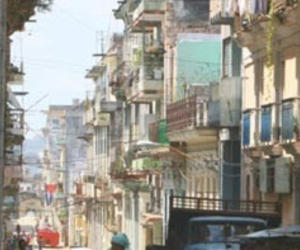Cuba takes measures to relieve housing crisis
- Submitted by: manso
- Editorial Articles
- 07 / 22 / 2011

By Juan Carlos Salazar Jul 22, 2011, 12:31 GMT. Havana - Georgina Emma Brizuela, who lives in the Havana neighbourhood of San Miguel del Padron, decided two years ago to become the legal owner of her home.
In July 2009, she embarked on a lengthy administrative battle, which the Cuban press describes as 'a real nightmare,' and is now about to throw in the towel.
She took a lawyers, wrote several letters and had meetings with a string off officials but never managed to get through the bureaucracy.
'The director had an accident,' the documents were 'badly done,' or it was necessary to carry out 'a new psycho-social examination' of her case, were among the excuses given.
'The file is still on the shelves, without anyone having signed it, and I have not legalized my situation in the house,' Brizuela says.
Her odyssey, reported by the youth newspaper Juventud Rebelde, is not an exception in Cuba, where people trying to find a place to live or to legalize their living situation have faced similar obstacles for half a century.
'It is common here for grandparents to live with their children and grandchildren, meaning three generations live in the same house, or for a divorced couple to continue living under the same roof against their will, because neither of them finds a place to live,' says Carmen, a fresh university graduate who lives with her parents.
No wonder Cubans have welcomed the reform announced by Raul Castro's government, as part of measures to 'update' the island's socialist model, which will allow residents or emigrants to sell and buy housing for the first time since the 1959 revolution.
The government ordered the administration to revise 188 legal norms related to housing, 'most of which establish administrative prohibitions,' in order to launch the reform in the end of this year.
But even until now, the difficulties have not prevented Cubans from solving their housing problems 'via the left' or 'the free way,' meaning, through illegal sales and purchases.
Even Granma, the official newspaper of the Cuban Communist Party, admitted that the bureaucratic morass and the endless laws and regulations encouraged 'illegality and corruption.'
Currently, the only way to move to a new home in Cuba is to swap homes. The system known as 'permuta' (exchange) requires complex bureaucratic procedures.
'I exchange a house for two flats,' 'I exchange a big flat for two small ones,' signs read on a central Havana street, a weekly meeting point for those trading on the informal 'housing stock exchange'.
Film director Juan Carlos Tabio took a humorous approach to the subject in the 1980s classic comedy Se Permuta, in which a seamstress sets up a chain of house exchanges in order to move further away in order to get rid of her daughter's suitor.
No reliable figures are available on the extent of the housing shortage in Cuba, but some statistics indicate that more than half a million homes might be needed.
That figure does not take into account the deteriorated state of thousands of flats or houses. 'Would you live in this house?' a taxi driver asks a tourist when passing by a building which is virtually in ruins in central Havana.
The reform announced by the government, which was approved by the Communist Party congress in April, will not benefit only Cubans living in their country, but also emigrants, who had until now lost their homes when moving abroad.
The new General Law on Housing will make the bureaucracy more flexible in order to ease the sale and purchase, exchange, donation or inheritance of housing. However, the law will not allow one person to own more than one home.
The reform is one of the most important ones in the package announced by the government.
It will alleviate a serious social problem, mobilize economic resources and create 'an important source of revenue for the state' through tax payments, an economist who did not want his name published told the German Press Agency dpa.
He also expected the reform to increase the currency influx from Cubans living abroad, which is currently estimated at about a billion dollars annually, he said.
'We shall notice that soon, because even a limited opening of the market will hike up property prices and people will want to buy quickly before that happens.'
Marta, who lives in the Havana neighbourhood of Vedado, wants to sell her flat and buy a house with a garden and yard, where she could set up independent lodgings for her two children.
'I have been offered 25,000 dollars for my flat, but a house costs 90,000 dollars,' she said.
Source: www.monstersandcritics.com/news/americas/news/article_1652576.php/Cuba-t...
Comments